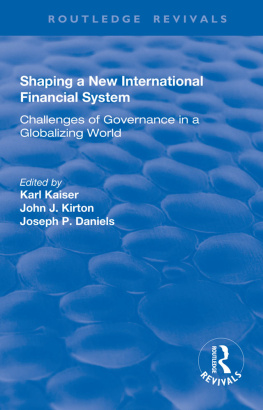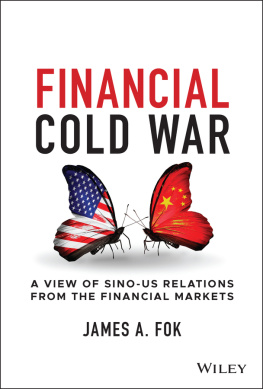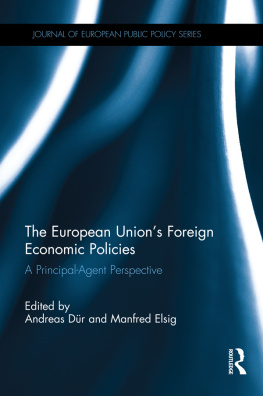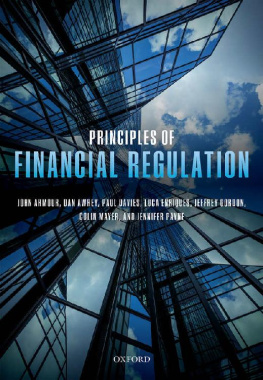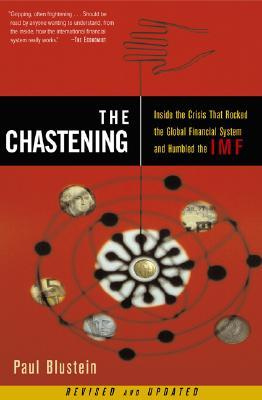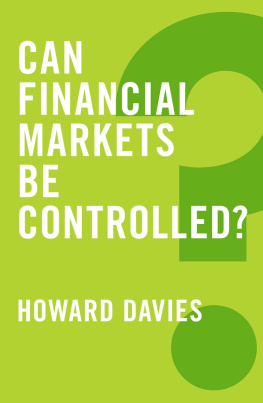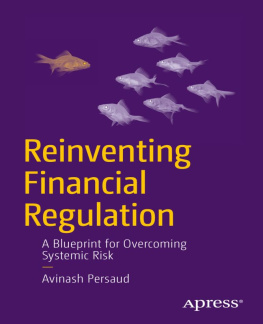Shaping a New International Financial System
This is a first-rate piece of work which contributes significantly to our understanding of the current state and future prospects for stability and order in the international financial system. The editors should be congratulated for bringing together such a wide range of scholarly and bureaucratic experts and for bringing such high standards of academic excellence to bear on the project. This is an excellent volume which will make a critical contribution to the debate over how and why the international financial structure might be transformed.
- Dr. Michael . Hawes, The J. William Fulbright Distinguished Chair in International and Area Studies, University of California at Berkeley
This is a timely and interesting collection on the future of the global financial order by a group of real experts in the field. It is difficult to imagine a more distinguished cast list. The book reads well and will be received with gratitude by scholars of international political economy as a rare example of the cross-fertilisation that is possible between policy-makers and academics.
- Andrew Williams, University of Kent, UK
The G8 and Global Governance Series
The G8 and Global Governance Series explores the issues, the institutions and the strategies of participants in the G8 network of global governance, as they address the challenges of shaping global order in the new millennium. Intensifying globalization is moving many once domestic issues into the international arena, requiring constant international co-operation, and demanding new collective leadership to direct the galaxy of multilateral institutions created in 1945. In response, the Group of Eight, composed of the world's major market democracies, including Russia and the European Union, is emerging as the effective source of global governance in the new era. This series focuses on the new issues at the centre of global governance, from finance, investment, and trade, through transnational threats to human security, to traditional political and security challenges. It examines the often invisible network of G8 and G7 institutions as they operate within and outside established international organizations to generate desired outcomes. It analyzes how individual G7 members and other international actors, including multinational firms and those from civil society, devise and implement strategies to secure their preferred global order.
Also in the series
Hanging In There
The G7 and G8 Summit in Maturity and Renewal Nicholas Bayne
ISBN 0 7546 1185
The G7/G8 System
Evolution, role and documentation Peter I. Hajnal
ISBN 1 84014 776 8
The G8's Role in the New Millennium
Edited by Michael R. Hodges, John J. Kirton and Joseph P. Daniels ISBN 1 84014 774 1
Shaping a New International Financial System
Challenges of governance in a globalizing world
Edited by
Karl Kaiser
Deutschen Gesellschaft fr Ausvartige Politik and University of Bonn
John J. Kirton
University of Toronto
Joseph P. Daniels
Marquette University
First published 2000 by Ashgate Publishing
Reissued 2018 by Routledge
2 Park Square, Milton Park, Abingdon, Oxon OX14 4RN
711 Third Avenue, New York, NY 10017, USA
Routledge is an imprint of the Taylor & Francis Group, an informa business
Copyright Karl Kaiser, John J. Kirton and Joseph P. Daniels 2000
All rights reserved. No part of this book may be reprinted or reproduced or utilised in any form or by any electronic, mechanical, or other means, now known or hereafter invented, including photocopying and recording, or in any information storage or retrieval system, without permission in writing from the publishers.
Notice:
Product or corporate names may be trademarks or registered trademarks, and are used only for identification and explanation without intent to infringe.
Publisher's Note
The publisher has gone to great lengths to ensure the quality of this reprint but points out that some imperfections in the original copies may be apparent.
Disclaimer
The publisher has made every effort to trace copyright holders and welcomes correspondence from those they have been unable to contact.
A Library of Congress record exists under LC control number: 00132590
ISBN 13: 978-1-138-72032-9 (hbk)
ISBN 13: 978-1-315-19509-4 (ebk)
Contents
Karl Kaiser, John J. Kirton, and Joseph P. Daniels
Nicholas Bayne
Takashi Kiuchi
Duncan Wood
John J. Kirton
George M. von Furstenberg
Joseph P. Daniels
Norbert Walter
Curzio Giannini
Olivier Davanne and Pierre Jacquet
George M. von Furstenberg
Alan M. Rugman
Karl Kaiser, John J. Kirton, and Joseph P. Daniels
Guide
Sir Nicholas Bayne, KCMG , is a Visiting Fellow at the International Relations Department of the London School of Economics and Political Science. As a British diplomat, he was High Commissioner to Canada, 19921996, Economic Director at the FCO, 1998-1992, and Ambassador to the OECD, 1985-1988. He is co-author, with Robert Putnam, of Hanging Together: Cooperation and Conflict in the Seven Power Summits.
Dr. Joseph P. Daniels is the Director of the Institute for Global Economic Affairs and Associate Professor of International Economics at Marquette University, Milwaukee, Wisconsin. As a Canadian-US Fulbright Research Scholar, he was Visiting Professor of Economics and International Relations, University of Toronto in 1997-98. An established scholar on the G7 Summit process, he has published widely on international economic policy processes.
Dr. Olivier Davanne is Scientific Advisor to the Conseil d'Analyse Economique (CAE) and Associate Professor at the University Paris-Dauphine. Before joining the CAE. he held various senior positions both in the private and in the public sector. He has also served as Senior Economic Advisor to the French minister in charge of labour and social affairs policies, as Codirector of European Economic Research with Goldman Sachs, and held various positions in the French Ministry of Finance.
Dr. Curzio Giannini is Deputy Head of the International Relations Department at the Banca d'Italia, where he previously served in the Research Department. He has been a member of several international groups, including the G-10 Committee on Payment and Settlement Systems, the G-10 Ad Hoc Working Group on the Resolution of Sovereign Liquidity Crises, established after the 1994-95 Mexican crisis, and has written widely on monetary policy, financial intermediation, and international financial institutions.
Dr. Pierre Jacquet is Deputy Director of the French Institute of International Relations (IFRI) in Paris and Chief Editor of IFRI's quarterly review Politique Etrangre. He teaches economics at Ecole Polytechnique and is also Professor of international economics and Head of the Department of Economics and Social Sciences at Ecole nationale des ponts et chausses. He is widely pubiished in the fields of globalization, international monetary and financial issues, the coordination of economic policies, trade policies and negotiations, and European integration.
Dr. Karl Kaiser is Otto Wolff-Director of the Research Institute of the German Society for Foreign Affairs in Berlin and Professor of Political Sciences at the University of Bonn. He has taught at Harvard University, where he returned several times as Visiting Professor, as well as at the Universities of Bonn, Johns Hopkins (Bologna), Saarbruecken, and Cologne. He published numerous books in the fields of German foreign policy, transatlantic relations, European integration and international affairs.

